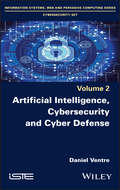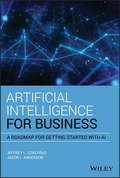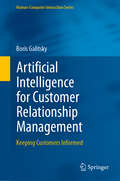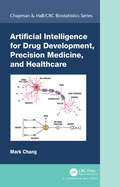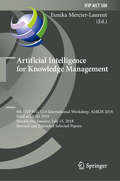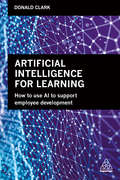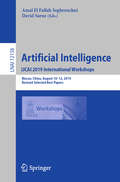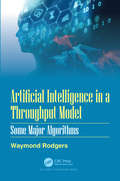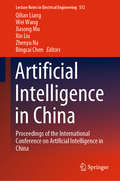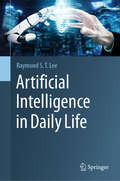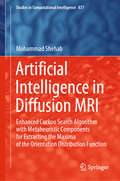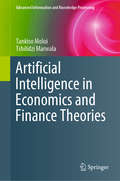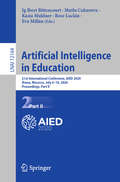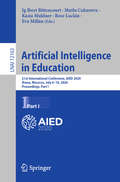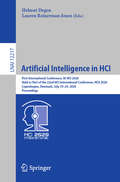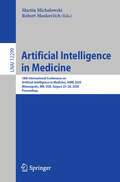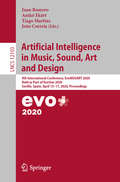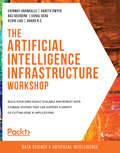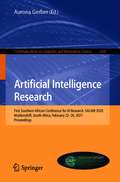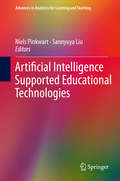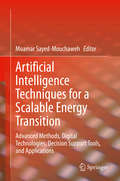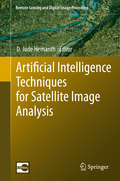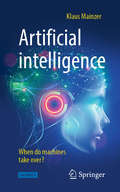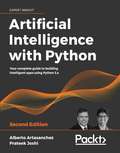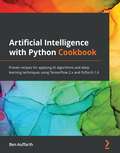- Table View
- List View
Artificial Intelligence, Cybersecurity and Cyber Defence
by Daniel VentreThe aim of the book is to analyse and understand the impacts of artificial intelligence in the fields of national security and defense; to identify the political, geopolitical, strategic issues of AI; to analyse its place in conflicts and cyberconflicts, and more generally in the various forms of violence; to explain the appropriation of artificial intelligence by military organizations, but also law enforcement agencies and the police; to discuss the questions that the development of artificial intelligence and its use raise in armies, police, intelligence agencies, at the tactical, operational and strategic levels.
Artificial Intelligence for Business: A Roadmap for Getting Started with AI
by Jason L. Anderson Jeffrey L. CoveyducArtificial Intelligence for Business: A Roadmap for Getting Started with AI will provide the reader with an easy to understand roadmap for how to take an organization through the adoption of AI technology. It will first help with the identification of which business problems and opportunities are right for AI and how to prioritize them to maximize the likelihood of success. Specific methodologies are introduced to help with finding critical training data within an organization and how to fill data gaps if they exist. With data in hand, a scoped prototype can be built to limit risk and provide tangible value to the organization as a whole to justify further investment. Finally, a production level AI system can be developed with best practices to ensure quality with not only the application code, but also the AI models. Finally, with this particular AI adoption journey at an end, the authors will show that there is additional value to be gained by iterating on this AI adoption lifecycle and improving other parts of the organization.
Artificial Intelligence for Customer Relationship Management: Keeping Customers Informed (Human–Computer Interaction Series)
by Boris GalitskyThis research monograph brings AI to the field of Customer Relationship Management (CRM) to make a customer experience with a product or service smart and enjoyable. AI is here to help customers to get a refund for a canceled flight, unfreeze a banking account or get a health test result. Today, CRM has evolved from storing and analyzing customers’ data to predicting and understanding their behavior by putting a CRM system in a customers’ shoes. Hence advanced reasoning with learning from small data, about customers’ attitudes, introspection, reading between the lines of customer communication and explainability need to come into play.Artificial Intelligence for Customer Relationship Management leverages a number of Natural Language Processing (NLP), Machine Learning (ML), simulation and reasoning techniques to enable CRM with intelligence. An effective and robust CRM needs to be able to chat with customers, providing desired information, completing their transactions and resolving their problems. It introduces a systematic means of ascertaining a customers’ frame of mind, their intents and attitudes to determine when to provide a thorough answer, a recommendation, an explanation, a proper argument, timely advice and promotion or compensation. The author employs a spectrum of ML methods, from deterministic to statistical to deep, to predict customer behavior and anticipate possible complaints, assuring customer retention efficiently. Providing a forum for the exchange of ideas in AI, this book provides a concise yet comprehensive coverage of methodologies, tools, issues, applications, and future trends for professionals, managers, and researchers in the CRM field together with AI and IT professionals.
Artificial Intelligence for Drug Development, Precision Medicine, and Healthcare (Chapman & Hall/CRC Biostatistics Series)
by Mark ChangArtificial Intelligence for Drug Development, Precision Medicine, and Healthcare covers exciting developments at the intersection of computer science and statistics. While much of machine-learning is statistics-based, achievements in deep learning for image and language processing rely on computer science&’s use of big data. Aimed at those with a statistical background who want to use their strengths in pursuing AI research, the book: · Covers broad AI topics in drug development, precision medicine, and healthcare. · Elaborates on supervised, unsupervised, reinforcement, and evolutionary learning methods. · Introduces the similarity principle and related AI methods for both big and small data problems. · Offers a balance of statistical and algorithm-based approaches to AI. · Provides examples and real-world applications with hands-on R code. · Suggests the path forward for AI in medicine and artificial general intelligence. As well as covering the history of AI and the innovative ideas, methodologies and software implementation of the field, the book offers a comprehensive review of AI applications in medical sciences. In addition, readers will benefit from hands on exercises, with included R code.
Artificial Intelligence for Knowledge Management: 6th IFIP WG 12.6 International Workshop, AI4KM 2018, Held at IJCAI 2018, Stockholm, Sweden, July 15, 2018, Revised and Extended Selected Papers (IFIP Advances in Information and Communication Technology #588)
by Eunika Mercier-LaurentThis book features a selection of extended papers presented at the 6th IFIP WG 12.6 International Workshop on Artificial Intelligence for Knowledge Management, AI4KM 2018, held in Stockholm, Sweden, in July 2018, in the framework of the International Joint Conference on Artificial Intelligence, IJCAI 2018.The 11 revised and extended papers were carefully reviewed and selected for inclusion in this volume. They present new research and innovative aspects in the field of knowledge management such as machine learning, knowledge models, KM and Web, knowledge capturing and learning, and KM and AI intersections.
Artificial Intelligence for Learning: How to use AI to Support Employee Development
by Donald ClarkArtificial intelligence is creating huge opportunities for workplace learning and employee development. However, it can be difficult for L&D professionals to assess what difference AI can make in their organization and where it is best implemented. Artificial Intelligence for Learning is the practical guide L&D practitioners need to understand what AI is and how to use it to improve all aspects of learning in the workplace. It includes specific guidance on how AI can provide content curation and personalization to improve learner engagement, how it can be implemented to improve the efficiency of evaluation, assessment and reporting and how chatbots can provide learner support to a global workforce.Artificial Intelligence for Learning debunks the myths and cuts through the hype around AI allowing L&D practitioners to feel confident in their ability to critically assess where artificial intelligence can make a measurable difference and where it is worth investing in. There is also critical discussion of how AI is an aid to learning and development, not a replacement as well as how it can be used to boost the effectiveness of workplace learning, reduce drop off rates in online learning and improve ROI. With real-world examples from companies who have effectively implemented AI and seen the benefits as well as case studies from organizations including Netflix, British Airways and the NHS, this book is essential reading for all L&D practitioners needing to understand AI and what it means in practice.
Artificial Intelligence. IJCAI 2019 International Workshops: Macao, China, August 10–12, 2019, Revised Selected Best Papers (Lecture Notes in Computer Science #12158)
by Amal El Fallah Seghrouchni David SarneThis book presents selected papers of 12 Workshops held in conjunction with the 28th International Joint Conference on Artificial Intelligence, IJCAI 2019, in Macao, China, in August 2019.The workshops included in this volume are: AI4KM 2019: 7th International Workshop on Artificial Intelligence for Knowledge Management and Innovation.FinNLP 2019: First International Workshop on Financial Technology and Natural Language Processing.OR 2019: 32nd International Workshop on Qualitative Reasoning.SURL 2019: Second International Workshop on Scaling-Up Reinforcement Learning.First International Workshop on Bringing Semantic Knowledge into Vision and Text Understanding.EASyHAT 2019: First International Workshop on Evaluation of Adaptive Systems for Human-Autonomy Teaming.ACAN 2019: 12th International Workshop on Agent-based Complex Automated Negotiations.First International Workshop on Deep Learning for Human Activity Recognition.HAI 2019: Second International Workshop on Humanizing AI.International Workshop on Language Sense on Computer.AISafety 2019: International Workshop on Artificial Intelligence Safety.DeLBP 2019: 4th International Workshop on Declarative Learning Based Programming.
Artificial Intelligence in a Throughput Model: Some Major Algorithms
by Waymond RodgersPhysical and behavioral biometric technologies such as fingerprinting, facial recognition, voice identification, etc. have enhanced the level of security substantially in recent years. Governments and corporates have employed these technologies to achieve better customer satisfaction. However, biometrics faces major challenges in reducing criminal, terrorist activities and electronic frauds, especially in choosing appropriate decision-making algorithms. To face this challenge, new developments have been made, that amalgamate biometrics with artificial intelligence (AI) in decision-making modeling. Advanced software algorithms of AI, processing information offered by biometric technology, achieve better results. This has led to growth in the biometrics technology industry, and is set to increase the security and internal control operations manifold. This book provides an overview of the existing biometric technologies, decision-making algorithms and the growth opportunity in biometrics. The book proposes a throughput model, which draws on computer science, economics and psychology to model perceptual, informational sources, judgmental processes and decision choice algorithms. It reviews how biometrics might be applied to reduce risks to individuals and organizations, especially when dealing with digital-based media.
Artificial Intelligence in China: Proceedings of the International Conference on Artificial Intelligence in China (Lecture Notes in Electrical Engineering #572)
by Qilian Liang Wei Wang Jiasong Mu Xin Liu Zhenyu Na Bingcai ChenThis book brings together papers presented at the International Conference on Artificial Intelligence in China (ChinaAI) 2019, which provided a venue for disseminating the latest advances and discussing the interactions and links between the various subfields of AI. Addressing topics that cover virtually all aspects of AI and the latest developments in China, the book is chiefly intended for undergraduate and graduate students in Electrical Engineering, Computer Science, and Mathematics, for researchers and engineers from academia and industry, and for government employees (e.g. at the NSF, DOD, and DOE).
Artificial Intelligence in Daily Life
by Raymond S. LeeGiven the exponential growth of Artificial Intelligence (AI) over the past few decades, AI and its related applications have become part of daily life in ways that we could never have dreamt of only a century ago. Our routines have been changed beyond measure by robotics and AI, which are now used in a vast array of services. Though AI is still in its infancy, we have already benefited immensely. This book introduces readers to basic Artificial Intelligence concepts, and helps them understand the relationship between AI and daily life. In the interest of clarity, the content is divided into four major parts. Part I (AI Concepts) presents fundamental concepts of and information on AI; while Part II (AI Technology) introduces readers to the five core AI Technologies that provide the building blocks for various AI applications, namely: Machine Learning (ML), Data Mining (DM), Computer Vision (CV), Natural Languages Processing (NLP), and Ontology-based Search Engine (OSE). In turn, Part III (AI Applications) reviews major contemporary applications that are impacting our ways of life, working styles and environment, ranging from intelligent agents and robotics to smart campus and smart city projects. Lastly, Part IV (Beyond AI) addresses related topics that are vital to the future development of AI. It also discusses a number of critical issues, such as AI ethics and privacy, the development of a conscious mind, and autonomous robotics in our daily lives.
Artificial Intelligence in Diffusion MRI: Enhanced Cuckoo Search Algorithm with Metaheuristic Components for Extracting the Maxima of the Orientation Distribution Function (Studies in Computational Intelligence #877)
by Mohammad ShehabThis book focuses on the use of artificial intelligence to address a specific problem in the brain – the orientation distribution function. It discusses three aspects: (i) Preparing, enhancing and evaluating one of the cuckoo search algorithms (CSA); (ii) Describing the problem: Diffusion-weighted magnetic resonance imaging (DW-MRI) is used for non-invasive investigations of anatomical connectivity in the human brain, while Q-ball imaging (QBI) is a diffusion MRI reconstruction technique based on the orientation distribution function (ODF), which detects the dominant fiber orientations; however, ODF lacks local estimation accuracy along the path. (iii) Evaluating the performance of the CSA versions in solving the ODF problem using synthetic and real-world data. This book appeals to both postgraduates and researchers who are interested in the fields of medicine and computer science.
Artificial Intelligence in Economics and Finance Theories (Advanced Information and Knowledge Processing)
by Tankiso Moloi Tshilidzi MarwalaAs Artificial Intelligence (AI) seizes all aspects of human life, there is a fundamental shift in the way in which humans are thinking of and doing things. Ordinarily, humans have relied on economics and finance theories to make sense of, and predict concepts such as comparative advantage, long run economic growth, lack or distortion of information and failures, role of labour as a factor of production and the decision making process for the purpose of allocating resources among other theories. Of interest though is that literature has not attempted to utilize these advances in technology in order to modernize economic and finance theories that are fundamental in the decision making process for the purpose of allocating scarce resources among other things. With the simulated intelligence in machines, which allows machines to act like humans and to some extent even anticipate events better than humans, thanks to their ability to handle massive data sets, this book will use artificial intelligence to explain what these economic and finance theories mean in the context of the agent wanting to make a decision. The main feature of finance and economic theories is that they try to eliminate the effects of uncertainties by attempting to bring the future to the present. The fundamentals of this statement is deeply rooted in risk and risk management. In behavioural sciences, economics as a discipline has always provided a well-established foundation for understanding uncertainties and what this means for decision making. Finance and economics have done this through different models which attempt to predict the future. On its part, risk management attempts to hedge or mitigate these uncertainties in order for “the planner” to reach the favourable outcome. This book focuses on how AI is to redefine certain important economic and financial theories that are specifically used for the purpose of eliminating uncertainties so as to allow agents to make informed decisions. In effect, certain aspects of finance and economic theories cannot be understood in their entirety without the incorporation of AI.
Artificial Intelligence in Education: 21st International Conference, AIED 2020, Ifrane, Morocco, July 6–10, 2020, Proceedings, Part II (Lecture Notes in Computer Science #12164)
by Ig Ibert Bittencourt Mutlu Cukurova Kasia Muldner Rose Luckin Eva MillánThis two-volume set LNAI 12163 and 12164 constitutes the refereed proceedings of the 21th International Conference on Artificial Intelligence in Education, AIED 2020, held in Ifrane, Morocco, in July 2020.* The 49 full papers presented together with 66 short, 4 industry & innovation, 4 doctoral consortium, and 4 workshop papers were carefully reviewed and selected from 214 submissions. The conference provides opportunities for the cross-fertilization of approaches, techniques and ideas from the many fields that comprise AIED, including computer science, cognitive and learning sciences, education, game design, psychology, sociology, linguistics as well as many domain-specific areas. *The conference was held virtually due to the COVID-19 pandemic.
Artificial Intelligence in Education: 21st International Conference, AIED 2020, Ifrane, Morocco, July 6–10, 2020, Proceedings, Part I (Lecture Notes in Computer Science #12163)
by Rose Luckin Ig Ibert Bittencourt Eva Millán Mutlu Cukurova Kasia MuldnerThis two-volume set LNAI 12163 and 12164 constitutes the refereed proceedings of the 21th International Conference on Artificial Intelligence in Education, AIED 2020, held in Ifrane, Morocco, in July 2020.*The 49 full papers presented together with 66 short, 4 industry & innovation, 4 doctoral consortium, and 4 workshop papers were carefully reviewed and selected from 214 submissions. The conference provides opportunities for the cross-fertilization of approaches, techniques and ideas from the many fields that comprise AIED, including computer science, cognitive and learning sciences, education, game design, psychology, sociology, linguistics as well as many domain-specific areas. *The conference was held virtually due to the COVID-19 pandemic.
Artificial Intelligence in HCI: First International Conference, AI-HCI 2020, Held as Part of the 22nd HCI International Conference, HCII 2020, Copenhagen, Denmark, July 19–24, 2020, Proceedings (Lecture Notes in Computer Science #12217)
by Helmut Degen Lauren Reinerman-JonesThis book constitutes the refereed proceedings of the First International Conference on Artificial Intelligence in HCI, AI-HCI 2020, held as part of the 22nd International Conference on Human-Computer Interaction, HCII 2020, in July 2020. The conference was planned to be held in Copenhagen, Denmark, but had to change to a virtual conference mode due to the COVID-19 pandemic. The conference presents results from academic and industrial research, as well as industrial experiences, on the use of Artificial Intelligence technologies to enhance Human-Computer Interaction. From a total of 6326 submissions, a total of 1439 papers and 238 posters has been accepted for publication in the HCII 2020 proceedings. The 30 papers presented in this volume were organized in topical sections as follows: Human-Centered AI; and AI Applications in HCI.pical sections as follows: Human-Centered AI; and AI Applications in HCI.
Artificial Intelligence in Medicine: 18th International Conference on Artificial Intelligence in Medicine, AIME 2020, Minneapolis, MN, USA, August 25–28, 2020, Proceedings (Lecture Notes in Computer Science #12299)
by Martin Michalowski Robert MoskovitchThe LNAI 12299 constitutes the papers of the 18th International Conference on Artificial Intelligence in Medicine, AIME 2020, which will be held online in August 2020. The 42 full papers presented together with 1short papers in this volume were carefully reviewed and selected from a total of 103 submissions. The AIME 2020 goals were to present and consolidate the international state of the art of AI in biomedical research from the perspectives of theory, methodology, systems, and applications.
Artificial Intelligence in Music, Sound, Art and Design: 9th International Conference, EvoMUSART 2020, Held as Part of EvoStar 2020, Seville, Spain, April 15–17, 2020, Proceedings (Lecture Notes in Computer Science #12103)
by João Correia Anikó Ekárt Juan Romero Tiago MartinsThis book constitutes the refereed proceedings of the 9th European Conference on Artificial Intelligence in Music, Sound, Art and Design, EvoMUSART 2020, held as part of Evo*2020, in Seville, Spain, in April 2020, co-located with the Evo*2020 events EuroGP, EvoCOP and EvoApplications.The 15 revised full papers presented were carefully reviewed and selected from 31 submissions. The papers cover a wide spectrum of topics and application areas, including generative approaches to music and visual art, deep learning, and architecture.
The Artificial Intelligence Infrastructure Workshop: Build your own highly scalable and robust data storage systems that can support a variety of cutting-edge AI applications
by Gareth Dwyer Chinmay Arankalle Bas Geerdink Kunal Gera Kevin Liao Anand N.S.Explore how a data storage system works – from data ingestion to representationKey FeaturesUnderstand how artificial intelligence, machine learning, and deep learning are different from one anotherDiscover the data storage requirements of different AI apps using case studiesExplore popular data solutions such as Hadoop Distributed File System (HDFS) and Amazon Simple Storage Service (S3)Book DescriptionSocial networking sites see an average of 350 million uploads daily - a quantity impossible for humans to scan and analyze. Only AI can do this job at the required speed, and to leverage an AI application at its full potential, you need an efficient and scalable data storage pipeline. The Artificial Intelligence Infrastructure Workshop will teach you how to build and manage one.The Artificial Intelligence Infrastructure Workshop begins taking you through some real-world applications of AI. You'll explore the layers of a data lake and get to grips with security, scalability, and maintainability. With the help of hands-on exercises, you'll learn how to define the requirements for AI applications in your organization. This AI book will show you how to select a database for your system and run common queries on databases such as MySQL, MongoDB, and Cassandra. You'll also design your own AI trading system to get a feel of the pipeline-based architecture. As you learn to implement a deep Q-learning algorithm to play the CartPole game, you'll gain hands-on experience with PyTorch. Finally, you'll explore ways to run machine learning models in production as part of an AI application.By the end of the book, you'll have learned how to build and deploy your own AI software at scale, using various tools, API frameworks, and serialization methods.What you will learnGet to grips with the fundamentals of artificial intelligenceUnderstand the importance of data storage and architecture in AI applicationsBuild data storage and workflow management systems with open source toolsContainerize your AI applications with tools such as DockerDiscover commonly used data storage solutions and best practices for AI on Amazon Web Services (AWS)Use the AWS CLI and AWS SDK to perform common data tasksWho this book is forIf you are looking to develop the data storage skills needed for machine learning and AI and want to learn AI best practices in data engineering, this workshop is for you. Experienced programmers can use this book to advance their career in AI. Familiarity with programming, along with knowledge of exploratory data analysis and reading and writing files using Python will help you to understand the key concepts covered.
Artificial Intelligence Research: First Southern African Conference for AI Research, SACAIR 2020, Muldersdrift, South Africa, February 22-26, 2021, Proceedings (Communications in Computer and Information Science #1342)
by Aurona GerberThis book constitutes the refereed proceedings of the First Southern African Conference on Artificial Intelligence Research, SACAIR 2020, held in Muldersdrift, South Africa, in February 2021. Due to the COVID-19 pandemic the SACAIR 2020 has been postponed to February 2021. The 19 papers presented were thoroughly reviewed and selected from 53 submissions. They are organized on the topical sections on AI for ethics and society; AI in information systems, AI for development and social good; applications of AI; knowledge representation and reasoning; machine learning theory.
Artificial Intelligence Supported Educational Technologies (Advances in Analytics for Learning and Teaching)
by Niels Pinkwart Sannyuya LiuThis book includes a collection of expanded papers from the 2019 Sino-German Symposium on AI-supported educational technologies, which was held in Wuhan, China, March, 2019. The contributors are distinguished researchers from computer science and learning science. The contributions are organized in four sections: (1) Overviews and systematic perspectives , (2) Example Systems, (3) Algorithms, and (4) Insights gained from empirical studies. For example, different data mining and machine learning methods to quantify different profiles of a learner in different learning situations (including interaction patterns, cognitive modes, knowledge skills, interests and emotions etc.) as well as connections to measurements in psychology and learning sciences are discussed in the chapters.
Artificial Intelligence Techniques for a Scalable Energy Transition: Advanced Methods, Digital Technologies, Decision Support Tools, and Applications
by Moamar Sayed-MouchawehThis book presents research in artificial techniques using intelligence for energy transition, outlining several applications including production systems, energy production, energy distribution, energy management, renewable energy production, cyber security, industry 4.0 and internet of things etc. The book goes beyond standard application by placing a specific focus on the use of AI techniques to address the challenges related to the different applications and topics of energy transition. The contributions are classified according to the market and actor interactions (service providers, manufacturers, customers, integrators, utilities etc.), to the SG architecture model (physical layer, infrastructure layer, and business layer), to the digital twin of SG (business model, operational model, fault/transient model, and asset model), and to the application domain (demand side management, load monitoring, micro grids, energy consulting (residents, utilities), energy saving, dynamic pricing revenue management and smart meters, etc.).
Artificial Intelligence Techniques for Satellite Image Analysis (Remote Sensing and Digital Image Processing #24)
by D. Jude HemanthThe main objective of this book is to provide a common platform for diverse concepts in satellite image processing. In particular it presents the state-of-the-art in Artificial Intelligence (AI) methodologies and shares findings that can be translated into real-time applications to benefit humankind. Interdisciplinary in its scope, the book will be of interest to both newcomers and experienced scientists working in the fields of satellite image processing, geo-engineering, remote sensing and Artificial Intelligence. It can be also used as a supplementary textbook for graduate students in various engineering branches related to image processing.
Artificial intelligence - When do machines take over? (Technik im Fokus)
by Klaus MainzerEverybody knows them. Smartphones that talk to us, wristwatches that record our health data, workflows that organize themselves automatically, cars, airplanes and drones that control themselves, traffic and energy systems with autonomous logistics or robots that explore distant planets are technical examples of a networked world of intelligent systems. Machine learning is dramatically changing our civilization. We rely more and more on efficient algorithms, because otherwise we will not be able to cope with the complexity of our civilizing infrastructure. But how secure are AI algorithms? This challenge is taken up in the 2nd edition: Complex neural networks are fed and trained with huge amounts of data (big data). The number of necessary parameters explodes exponentially. Nobody knows exactly what is going on in these "black boxes". In machine learning we need more explainability and accountability of causes and effects in order to be able to decide ethical and legal questions of responsibility (e.g. in autonomous driving or medicine)! Besides causal learning, we also analyze procedures of tests and verification to get certified AI-programs. Since its inception, AI research has been associated with great visions of the future of mankind. It is already a key technology that will decide the global competition of social systems. "Artificial Intelligence and Responsibility" is another central supplement to the 2nd edition: How should we secure our individual liberty rights in the AI world? This book is a plea for technology design: AI must prove itself as a service in society.
Artificial Intelligence with Python: Your complete guide to building intelligent apps using Python 3.x and TensorFlow 2, 2nd Edition
by Prateek Joshi Alberto ArtasanchezNew edition of the bestselling guide to artificial intelligence with Python, updated to Python 3.x and TensorFlow 2, with seven new chapters that cover RNNs, AI & Big Data, fundamental use cases, chatbots, and more. Key Features Completely updated and revised to Python 3.x, and TensorFlow 2 Seven new chapters that include AI on the cloud, RNNs and DL models, feature engineering, the machine learning data pipeline, and more New author with 25 years of experience in artificial intelligence across multiple industries and enterprise domains Book Description Artificial Intelligence with Python, Second Edition is an updated and expanded version of the bestselling guide to artificial intelligence using the latest version of Python 3.x and TensorFlow 2. Not only does it provide you an introduction to artificial intelligence, this new edition goes further by giving you the tools you need to explore the amazing world of intelligent apps and create your own applications. This edition also includes seven new chapters on more advanced concepts of Artificial Intelligence, including fundamental use cases of AI; machine learning data pipelines; feature selection and feature engineering; AI on the cloud; the basics of chatbots; RNNs and DL models; and AI and Big Data. Finally, this new edition explores various real-world scenarios and teaches you how to apply relevant AI algorithms to a wide swath of problems, starting with the most basic AI concepts and progressively building from there to solve more difficult challenges so that by the end, you will have gained a solid understanding of, and when best to use, these many artificial intelligence techniques. What you will learn Understand what artificial intelligence, machine learning, and data science are Explore the most common artificial intelligence use cases Learn how to build a machine learning pipeline Assimilate the basics of feature selection and feature engineering Identify the differences between supervised and unsupervised learning Discover the most recent advances and tools offered for AI development in the cloud Develop automatic speech recognition systems and chatbots Understand RNNs and various DL models Who this book is for The intended audience for this book is Python developers who want to build real-world Artificial Intelligence applications. Basic Python programming experience and awareness of machine learning concepts and techniques is mandatory.
Artificial Intelligence with Python Cookbook: Proven recipes for applying AI algorithms and deep learning techniques using TensorFlow 2.x and PyTorch 1.6
by Ben AuffarthWork through practical recipes to learn how to solve complex machine learning and deep learning problems using PythonKey FeaturesGet up and running with artificial intelligence in no time using hands-on problem-solving recipesExplore popular Python libraries and tools to build AI solutions for images, text, sounds, and imagesImplement NLP, reinforcement learning, deep learning, GANs, Monte-Carlo tree search, and much moreBook DescriptionArtificial intelligence (AI) plays an integral role in automating problem-solving. This involves predicting and classifying data and training agents to execute tasks successfully. This book will teach you how to solve complex problems with the help of independent and insightful recipes ranging from the essentials to advanced methods that have just come out of research.Artificial Intelligence with Python Cookbook starts by showing you how to set up your Python environment and taking you through the fundamentals of data exploration. Moving ahead, you'll be able to implement heuristic search techniques and genetic algorithms. In addition to this, you'll apply probabilistic models, constraint optimization, and reinforcement learning. As you advance through the book, you'll build deep learning models for text, images, video, and audio, and then delve into algorithmic bias, style transfer, music generation, and AI use cases in the healthcare and insurance industries. Throughout the book, you'll learn about a variety of tools for problem-solving and gain the knowledge needed to effectively approach complex problems.By the end of this book on AI, you will have the skills you need to write AI and machine learning algorithms, test them, and deploy them for production.What you will learnImplement data preprocessing steps and optimize model hyperparametersDelve into representational learning with adversarial autoencodersUse active learning, recommenders, knowledge embedding, and SAT solversGet to grips with probabilistic modeling with TensorFlow probabilityRun object detection, text-to-speech conversion, and text and music generationApply swarm algorithms, multi-agent systems, and graph networksGo from proof of concept to production by deploying models as microservicesUnderstand how to use modern AI in practiceWho this book is forThis AI machine learning book is for Python developers, data scientists, machine learning engineers, and deep learning practitioners who want to learn how to build artificial intelligence solutions with easy-to-follow recipes. You'll also find this book useful if you're looking for state-of-the-art solutions to perform different machine learning tasks in various use cases. Basic working knowledge of the Python programming language and machine learning concepts will help you to work with code effectively in this book.
